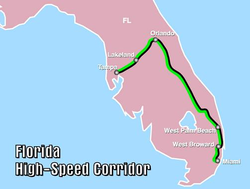| Florida High-Speed Corridor | |
|---|---|
 Federal Railroad Administration map of the Florida High-Speed Corridor | |
| Overview | |
| Status | Canceled |
| Termini | |
| Service | |
| Type | High-speed rail |
| History | |
| Opened | Proposed |
| Technical | |
| Line length | 324 mi (521 km)[1] |
| Number of tracks | 2 |
| Track gauge | 4 ft 8+1⁄2 in (1,435 mm) |
| Operating speed | 168–186 mph (270–300 km/h) |
The Florida High-Speed Corridor is a canceled high-speed rail project in the U.S. state of Florida. Initial service would have run between the cities of Tampa and Orlando, with plans to then extend service to South Florida, terminating in Miami. Trains with a top speed of 168 mph (270 km/h) to 186 mph (300 km/h) would run on dedicated rail lines alongside the state's existing highway network.
Construction of the line was slated to begin in 2011, with the initial Tampa-Orlando phase completed by 2014.[2] On February 16, 2011, Florida Governor Rick Scott formally announced that he would be rejecting federal funds to construct the high-speed railway, thereby killing the Florida High-Speed Rail project. Governor Scott said the project would be "far too costly to taxpayers" and that "the risk[s] far outweigh the benefits".[3]
In the wake of the project's cancellation, a private sector express passenger service running across much of the proposed route has been proposed by All Aboard Florida, now known as Brightline. This service began operations in 2018 and now runs passenger trains between Orlando and Miami. Its extension from Orlando to Tampa is in the early planning stages and has yet to be fully funded.
- ^ Cite error: The named reference
White House Fact Sheetwas invoked but never defined (see the help page). - ^ Jackovics, Ted (January 28, 2010). "Obama calls high speed rail funding a 'down payment'". The Tampa Tribune. Archived from the original on January 5, 2013. Retrieved February 18, 2010.
- ^ "UPDATE 1-Florida governor rejects US high-speed rail funds". Reuters. February 16, 2011.
© MMXXIII Rich X Search. We shall prevail. All rights reserved. Rich X Search
